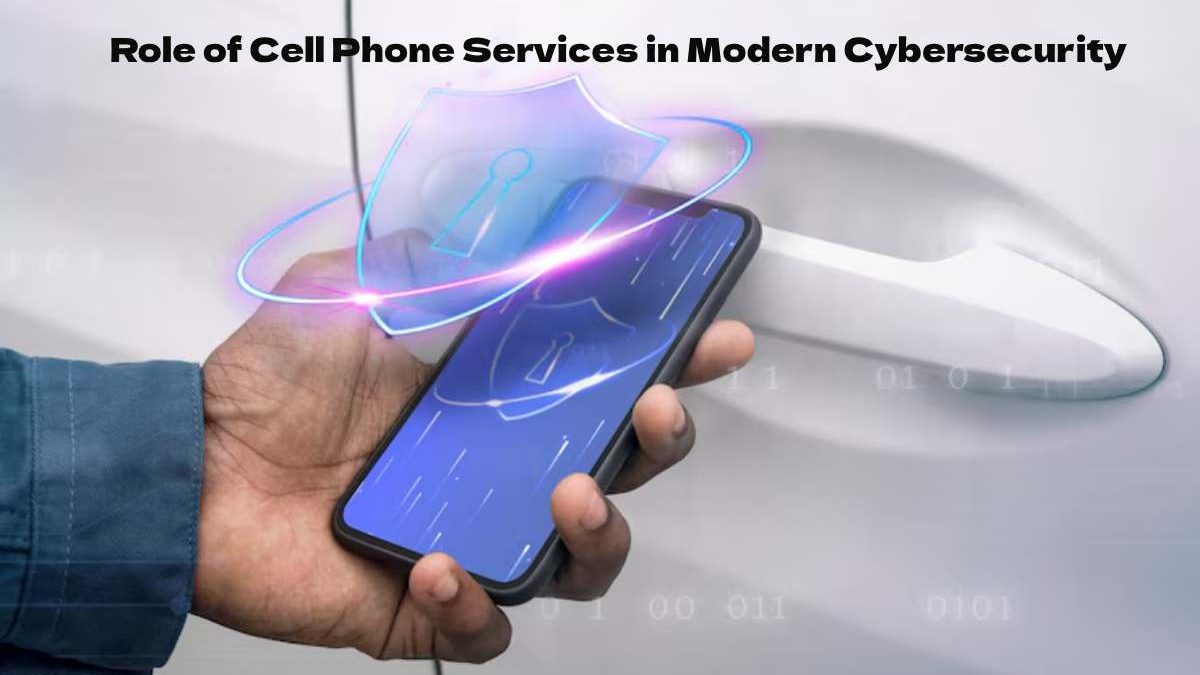Role of Cell Phone Services in Modern Cybersecurity
Today’s world has become more hyper-connected than any other era, and your mobile device functions as your indispensable tool for communication, productivity, and entertainment. This interconnectivity means the role of cell phone services extends beyond mere convenience and now encompasses a critical aspect of cybersecurity.
As smartphones become ubiquitous and mobile data usage proliferates, the need to protect sensitive information and mitigate cybersecurity risks has never been more pressing. This comprehensive article will cover the multifaceted role of cell phone services in modern cybersecurity, exploring how they contribute to data protection, threat detection, and overall digital resilience.
Table of Contents
Evolution of Cell Phone Services
You had to be there to see the old school and blocky cell phones to grasp just how far mobile technology has come. The evolution of cell phone services has been a remarkable journey marked by technological advancements, increased connectivity, and a transformative impact on how you communicate and access information.
From the early days of basic voice communication to the present era of high-speed data connectivity and advanced mobile services, the evolution of cell phone services has shaped the way people live, work, and interact with the world.
From voice calls to data connectivity
The inception of cell phone services marked a revolution in telecommunications, enabling you to communicate with other users wirelessly via voice calls. However, with technological advancements, cell phone services have evolved to encompass data connectivity, allowing you to access the internet, send emails, engage in social media, and conduct financial transactions—all from the palm of your hand.
This transition has revolutionized how you and other users interact with mobile devices and introduced new cybersecurity challenges and vulnerabilities.
The emergence of mobile networks
The proliferation of mobile networks, including 3G, 4G, and now 5G, has facilitated high-speed data transmission and enhanced connectivity on a global scale. While these networks offer you unparalleled convenience and accessibility, they also serve as conduits for cyber threats, including phishing attacks, malware, and unauthorized access to your sensitive data.
Securing cell phone services has become paramount in safeguarding your personal and corporate information from potential cyber threats.
The Intersection of Cell Phone Services and Cybersecurity
You need more protection from the digital world than the real one. The intersection of cell phone services and cybersecurity represents a critical nexus in the increasingly digitized world as you know it.
As mobile devices become indispensable tools for communication, productivity, and access to sensitive information, they also become prime targets for cyber threats.
Understanding the intricate relationship between cell phone services and cybersecurity is essential to protecting your personal and organizational data, safeguarding your privacy, and mitigating the risks posed by malicious actors.
Data encryption and secure transmission
Cell phone services employ encryption protocols to secure data transmission over mobile networks. Encryption algorithms encode your sensitive information, rendering it unintelligible to unauthorized parties. By encrypting your data in transit, cell phone services protect you against interception and eavesdropping by cybercriminals.
Authentication and access control
Cell phone services implement authentication mechanisms, such as passwords, biometrics, and two-factor authentication (2FA), to verify your identity and control access to mobile devices and applications. Strong authentication measures mitigate the risk of unauthorized access and protect against account takeover attacks.
Mobile Device Management (MDM)
MDM solutions enable organizations to manage and protect mobile devices used by employees. From enforcing security policies to remotely wiping lost or stolen devices, MDM enhances endpoint security and ensures compliance with cybersecurity standards.
Mobile application security
Cell phone services play a vital role in ensuring the security of your mobile applications. App stores implement rigorous vetting processes to detect and remove malicious apps that pose security risks to your devices and data. Additionally, app permissions and sandboxing mechanisms limit the scope of potential security breaches.
Network firewalls and intrusion detection systems
Mobile network operators deploy firewalls and intrusion detection systems (IDS) to monitor and defend against unauthorized access and malicious activities on their networks. These security measures help detect and mitigate cyber threats in real time, safeguarding your communication and data traffic.
Secure remote access and VPNs
Cell phone services enable secure remote access to your corporate networks through virtual private networks (VPNs). VPNs encrypt data traffic between mobile devices and corporate servers, ensuring confidentiality and integrity when accessing your sensitive resources over untrusted networks, such as public Wi-Fi hotspots.
Endpoint security solutions
Endpoint security solutions, such as mobile threat defense (MTD) and antivirus software, help detect and mitigate malware as well as other security threats on your mobile devices. These solutions protect real-time against malicious apps, phishing attempts, and other cyber attacks targeting mobile endpoints..
Secure messaging and encryption
Cell phone services can offer secure messaging platforms that encrypt your communications end-to-end, preventing unauthorized interception and surveillance. End-to-end encryption ensures that only you and other intended recipients can access and decipher the messages, enhancing privacy and confidentiality.
Mobile device updates and patch management
Consistent software updates and patch management are critical to your mobile device’s security. Cell phone services facilitate the distribution of security patches and software updates to mobile devices, addressing vulnerabilities and strengthening your overall security posture.
User education and awareness
Cell phone service providers are crucial in educating you and other users about cybersecurity best practices and raising awareness about emerging threats. Proactive communication and security advisories empower you to recognize and mitigate potential risks to your digital safety.

Challenges and Considerations
Addressing the challenges and considerations in the correlation of cell phone services and cybersecurity is paramount to ensuring data integrity, confidentiality, and availability on your mobile devices. As technology evolves and cyber threats become increasingly sophisticated, it is essential to identify and mitigate potential risks to your mobile security.
Privacy concerns
While cell phone services enhance cybersecurity, they raise concerns about privacy. Data collection practices, location tracking, and behavioral analytics conducted by mobile service providers may compromise your privacy and raise ethical questions about data stewardship and consent.
Emerging threat landscape
The evolving threat landscape poses massive challenges to cell phone services and cybersecurity professionals. Advanced persistent threats (APTs), zero-day exploits, and sophisticated malware strains target your mobile devices and exploit vulnerabilities in your mobile operating systems and applications.
Regulatory compliance
Regulatory frameworks impose stringent requirements on your mobile service providers regarding data protection, privacy, and transparency. Compliance with regulatory mandates requires robust governance, risk management, and compliance (GRC) frameworks.
Cybersecurity skills gap
The need for cybersecurity professionals with expertise in mobile security poses a significant challenge to cell phone services and organizations seeking to secure their mobile environments. Addressing the cybersecurity skills gap requires investment in training, education, and workforce development initiatives.
Integration and interoperability
Achieving seamless integration and interoperability between disparate security solutions and mobile platforms remains complex. Cell phone services must collaborate with technology vendors and cybersecurity partners to ensure compatibility and synergy across security ecosystems.
Future Directions and Innovations
As the intersection of cell phone services and cybersecurity continues to evolve, you need to anticipate future trends and innovations that will dictate the landscape of your mobile security. From advancements in technology to emerging threats and regulatory developments, several key areas are poised to influence the future direction of your mobile security.
AI-powered threat detection
The incorporation of artificial intelligence, or AI, and machine learning, or ML, technologies in mobile security solutions enables the detection of threats and analysis of behaviors in advance. AI-driven threat intelligence platforms enhance situational awareness and enable rapid response to emerging cyber threats.
Zero-trust security architectures
Zero-trust security architectures advocate for a “never trust, always verify” approach to cybersecurity, requiring continuous authentication and access controls based on dynamic risk assessments. Cell phone services have increasingly adopted zero-trust principles to enhance mobile security and protection against insider threats.
Blockchain-based solutions
Blockchain technology promises to enhance the security, transparency, and integrity of your mobile transactions and communications. Cell phone services explore blockchain-based solutions for identity management, secure messaging, and decentralized authentication.
Biometric authentication
Biometric authentication methods, which include facial recognition, fingerprint recognition, and iris scanning, offer enhanced security and convenience for mobile users—cell phone services leverage biometric authentication to strengthen your access controls and combat identity theft and fraud.
Quantum-safe cryptography
Quantum computing severely threatens conventional cryptographic algorithms to secure your mobile communications and data. Cell phone services have invested in quantum-safe cryptography solutions to future-proof your mobile security against quantum-enabled cyber attacks.
Great Innovations Require Greater Vigilance
Cell phone services are pivotal in modern cybersecurity, serving as your frontline defense against many cyber threats targeting your mobile devices and data. Cell phone services employ a multifaceted approach to safeguarding your privacy, confidentiality, and integrity, from data encryption and secure transmission to mobile device management and threat detection.
As the digital landscape grows and cyber threats become more sophisticated, cell phone services must remain vigilant, adaptive, and proactive in addressing emerging security challenges.
By embracing innovation, collaboration, and best practices in mobile security, cell phone services can continue to enhance cybersecurity resilience and ensure a safer and more secure mobile experience for you and other users worldwide.

